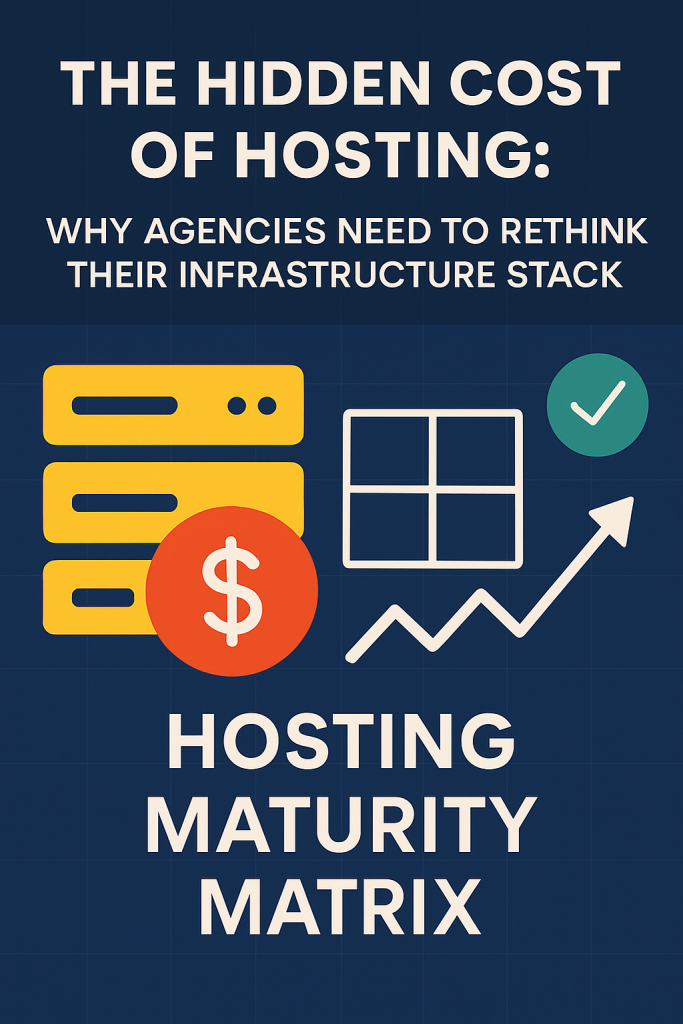
Why Infrastructure is Important as You Never Thought
Hosting seems like a concern that can be addressed later when you are still in the middle of the development process. Your team is saturated with writing clean code, delivering features requirements, and sticking to deadlines. The server junk? Those are the details which can work out during deployment.
Such an attitude is more expensive on the software firms than they could imagine.
Consider the situation when you recently had to tell a client that the software he is using had low performance. Or when you needed to work on a weekend, as a server went down halfway through a vital demo. These are not just technical glitches they are affairs that break business relationships and leave your staff exhausted.
Good developers desire to have robust infrastructure to work through. When there is always a problem with your hosting configuration, this lowers the overall team morale and productivity and often can impact your talent attraction and retention. No one wants to waste his or her Friday night repairing server settings when he or she should be solving interesting problems.
On the clientele front, the performance of your application is bound to be the initial point of cross reference when they undertake to evaluate your work. They may not be aware of the beauty of your code structure or like the fact their database was optimized but they will certainly know when their applications are slow or took down by the application being updated.
Hosting Challenge of the Development Company
The hosting services providers that software development companies require are unique and generic hosts are not designed to address such issues.
The first one is the variety of technology stacks. One customer may require a Node.js with MongoDB, another customer may require Python with PostgreSQL, and the next customer may want the .NET with SQL Server. The burden of operating such atmospheres in various hosting providers is something of a nightmare soon.
And last but not least, there is the scaling problem. The resources required in development projects are usually unpredictable. In development and testing operations, there may be little use of resources. However when the application launches, traffic patterns may turn out to be absolutely different than expected. These changes require your hosting solution to cope up without your manual intervention.
Clients also have different security requirements that vary drastically. The needs of simple portfolio websites are not the same as the healthcare app with patient info management or a financial technology that transacts money. You require a hosting system, which will be scalable to various compliance needs without placing you in the position to develop into a security expert.
There are also some development processes that generate distinctive challenges. It requires staging environments that resemble production, simple deployment mechanisms, and a quick way of spinning up new environments to carry out code testing or when giving a demonstration to a client. These are fundamental demands of development needs which are unnecessarily convoluted by traditional hosting arrangements.
The Reality of the Hosting Rates
When it comes to considering development company costs, most businesses tend to consider the money that appears on the bills, provided by their hosting providers every single month. Yet the actual costs are deeper rooted.
There is the time that the developers lose on infrastructure. Each hour your senior developers are spending configuring servers, debugging deployment issues, and working with performance problems they are not working on client work. Those infrastructure tasks are costly in terms of typical developer hourly rates very fast.
Also there is opportunity cost of projects that you cannot undertake due to the constraints of the infrastructure. Perhaps, a prospective client wants an application that can support unanticipated floods, yet you do not think that your current hosting solution can do the magic. Or maybe they require certain compliance accreditation that your host does not comply with.
Problems of client satisfaction are also long term in costs. Applications that are underperforming or are experiencing downtime are not only going to cost you to your present projects but it will also reflect in your reputation and less chances of a referral or a re-occurring business.
There are also unseen productivity losses. Developers will be afraid to do frequent updates when deployment is problematic or not trustworthy. This makes the development cycles slower and lacks agility that the clients demand of software development in the present age.
The managed cloud hosting solution
The main cloud hosting solution to these problems is so-called managed cloud hosting, where the enterprise-level infrastructure is delivered without having your team turn into server administrators.
The most notable distinction is that the managed solutions eliminate the complexity involved in the operations and provide you with the flexibility and the performance that your applications require. By putting those systems servers on autopilot, your team gets to spend more time doing what they were best at building great software.
These have got auto scaling functions, which imply that your applications will not require manual adjustments to cope with traffic surges. No matter what, whether an application made by a client is covered by the media or they launch a successful marketing campaign, the infrastructure adjusts itself.
Security is also no longer a burden. The providers of managed cloud hosting have best practices regarding security, compliance requirements and documentation that needs to be provided during client audit. This is of particular value when one is tasked with serving clients in highly regulated markets.
Well-set up staging environments, automated deployment system, and rollback capability make development processes a lot better. Your team will be able to go through the iterations as well as deploy confidently.
What KloudBean Offers to the Development Teams
KloudBean is aware of the needs of software development firms as they have designed their platform along with it.
Its cloud hosting service is on managed cloud offers auto scaling that delivers working auto scaling to real applications. KloudBean will provide intelligent resource management of specific application architecture based on observation of actual usage instead of generic autoscaling which may not interpret your architecture.
The security features are not complex, but inclusive. They manage SSL certificates, frequent security updates, malware checks, and include the compliance documents that customers usually need. It is the type of security support that is the lifeline of the development companies who have clients in the healthcare, finances or ecommerce channel.
KloudBean supports staging and development environments and therefore one can build isolated environments as a test, a demonstration to the client or one can utilize them as a development work. You are also able to provision new environments fast without traversing complicated ways of configuration.
They have automatic and reliable backup and disaster recovery. Your data and applications are secured and do not need manual backup maintenance and complex recovery processes.
The alerting and monitoring tools will give you an insight into the performance of your applications, but they will not overburden your team with useless alerts. You would be notified about actual problems and regular care and optimization would occur automatically.
Supporting more than one technology stack on a single platform is one of the features that are extremely beneficial to development companies. Regardless of the type of apps you are deploying to be them in PHP, Node.js services, Python web apps, or .NET solutions, the platform will take care of the requirements behind the infrastructure.
Their CDN integration will make sure that applications will deliver well to the users no matter where they are. It is particularly critical to the development firms dealing with customers that have an international following.
The tools of the database management provide automated backups, performance optimization, and scaling to well-known database systems, such as MySQL, PostgreSQL, and MongoDB. Your applications gain enterprise grade database infrastructure with the simplicity of not having to worry about it.
Call us now!
Boost your digital presence with our expert.
RealWorld Effects to Development Processes
The changeover of fighting with infrastructure and dependable managed cloud hosting also influences every one of your developmental processes.
Deployment is no longer a matter of dread by your team. Even pushing updates on a regular basis is not hectic, but normal when the staging setup and automated deployment procedures are in order. This promotes more deployments hence result to better software and happy clients.
Demos made by a client are more secure. Having your infrastructure that you know is reliable, you have time to focus on some features in your application rather than stressing on whether all will be functioning when it is time to show it.
When the infrastructure does not interrupt the work of the developers every now and then, team productivity is enhanced. Rather than swapping the context of writing code with addressing server issues, your team is able to stay on track on development efforts.
A consistent performance of their applications on the part of the clients enhances their relationship. A solid infrastructure enters as an essential infrastructure, which remains behind how one sees all the efforts of your team.
Creating Strategic Infrastructure within your Value Proposition
Intelligent development firms improve not only on the issues regarding lack of infrastructure, but in effect they transform sensible infrastructure into a competitive edge.
Infrastructure reliability is one of the areas that may give the company an edge when it comes to potential clients conducting an evaluation of development partners. Having confidence to communicate the way you host, how you ensure the security, performance options all of this creates trust and makes higher prices acceptable.
There are other development firms that also engage in consulting on infrastructures. They can assist their clients in the appraisal of the existing hosting system and offer changes. This ensures that you have more revenue streams besides the fact that you can stand out as a holistic technical partner.
Managed hosting is packaged in the on-going maintenance and support packages offered by others. Rather than presenting the clients with a ready-made application, they offer full-fledged solutions that involve quality hosting infrastructure.
The trick is to support infrastructure as an aspect of your technical knowledge rather than a logistics point. Clients also like to work with development partners that know end-to-end technology, including the code and the deployment.
Transiting to it
The transition to managed cloud hosting should involve strategic planning, although the process does not need to be invasive to the workflow of the development team.
Begin by listing down projects, which need better infrastructure. Perhaps you have a customer whose application is underperforming, or a project that deployment has been quite a struggle. These are fine migration candidates.
Make planning of migration. Quality cloud hosting providers such as KloudBean Managed Cloud Hosting (https://kloudbean.com) provide migration services and would be able to make the transition run smoothly. Do not undertake a mammoth task of moving everything and follow up with less critical applications and familiarize yourself with the platform and migrate the most important project at that moment.
Make your development team involved in the evaluation process. They are the very people operating the new infrastructure and, thus, their feedback on the features, work processes, and tools is useful. The adoption process is a lot easier when developers are eager to explore new features of the available infrastructure.
Inform the clients regarding infrastructure development. The majority of clients will like to know you are spending money to provide them with better performance and reliability to their applications. Others even may want to pay part of the hosting fees in order to get a better performance.
Input them into documentation of new processes and working procedures. Once your team feels comfortable with the ability of managed cloud hosting, develop documentation which will help in terms of consistency across projects and give way to introduce new team members to the particular set of projects at hand.
Call us now!
Boost your digital presence with our expert.
The LongTerm Strategic Advantages
The returns on this investment in adequate managed cloud hosting infrastructure accrue.
Your development team will be more productive because they no longer have to spend so much time on routine work and deal more with something that is interesting to them. It will result in more job satisfaction and the ability to attract quality developers.
The improved performance of the applications made by the clients leads to client satisfaction. Satisfied customers will leave you more recommendation, bigger projects and in the long run you will have a long term relationship that is a source of business stability.
You would feel confident that your company would be able to handle more complicated and challenging projects when you are assured about the capabilities of your infrastructure. This creates room to do more and more highvalue work and high pricing.
The engineering expertise that your company acquires through collaboration with current cloud technology infrastructure renders your team more resourceful and maintains your business an entrant in a changing world of technology.
Some Questions to Your Current Setup
You have to be frank with yourself and answer the following questions before making any changes to your situation regarding the hosting you currently have:
What is the amount of time your development team wastes per month to solve hosting related issues? Add the time that is dedicated to the deployment issues, troubleshooting performance, security updates, and back-up administration.
Are you sure that you will be able to last any sudden spike in traffic or any sudden spike in resource needs? Have you ever rejected a project due to infrastructure issues?
What do your clients think about the functions of applications you already made to them? Are people complaining of low speed and access?
How many more dollars would you earn when you and your team could be fully dedicated to development rather than taking care of infrastructure?
How much time do you think you could take to put back client applications and data in case your present hosting system were to vanish overnight?
Taking Action
The software creating business unit is competitive and companies that emerge on the top are those who can create outstanding results routinely. It is a given that your hosting and infrastructure either serves that or goes against it.
Managed cloud hosting is not only problem solving, but it is also a way of positioning your development company to be ready to take the next step of opportunities and growth. Technology continues to change at a very fast pace, and it becomes easier to keep pace with changes in demands, as well as, technology when the infrastructure has flexible and scalable infrastructure.
Your customers believe in the relationship with you because you make software that is dependable and highly functioning. Your dev team will strive to use tools and infrastructure that will make their life easier and more fun. To succeed your business requires the operation effectiveness and competitive advantages of getting infrastructure right.
The issue is not whether managed cloud hosting is an investment that is worth making. The issue is whether you can afford to continue battling with infrastructure issues when there are superior solutions to be availed of.
You want to do the best of the best on your next client project. You have a right to offer infrastructure that can be counted on in your development team. Your company should have all the competitive advantages possible.
The development companies who are aware that infrastructure should be regarded as a strategic asset rather than a necessary evil are the same companies that will rise in an ever-competitive world. It is either you would want to be identified with some of them or continue fighting identical infrastructure wars like all the others.

Gurupritsingh Saini is an entrepreneur and the one who leads his team at AppAspect Technologies Private Limited. He has vast knowledge of mobile application development. AppAspect helps businesses by providing website and mobile app development services.







